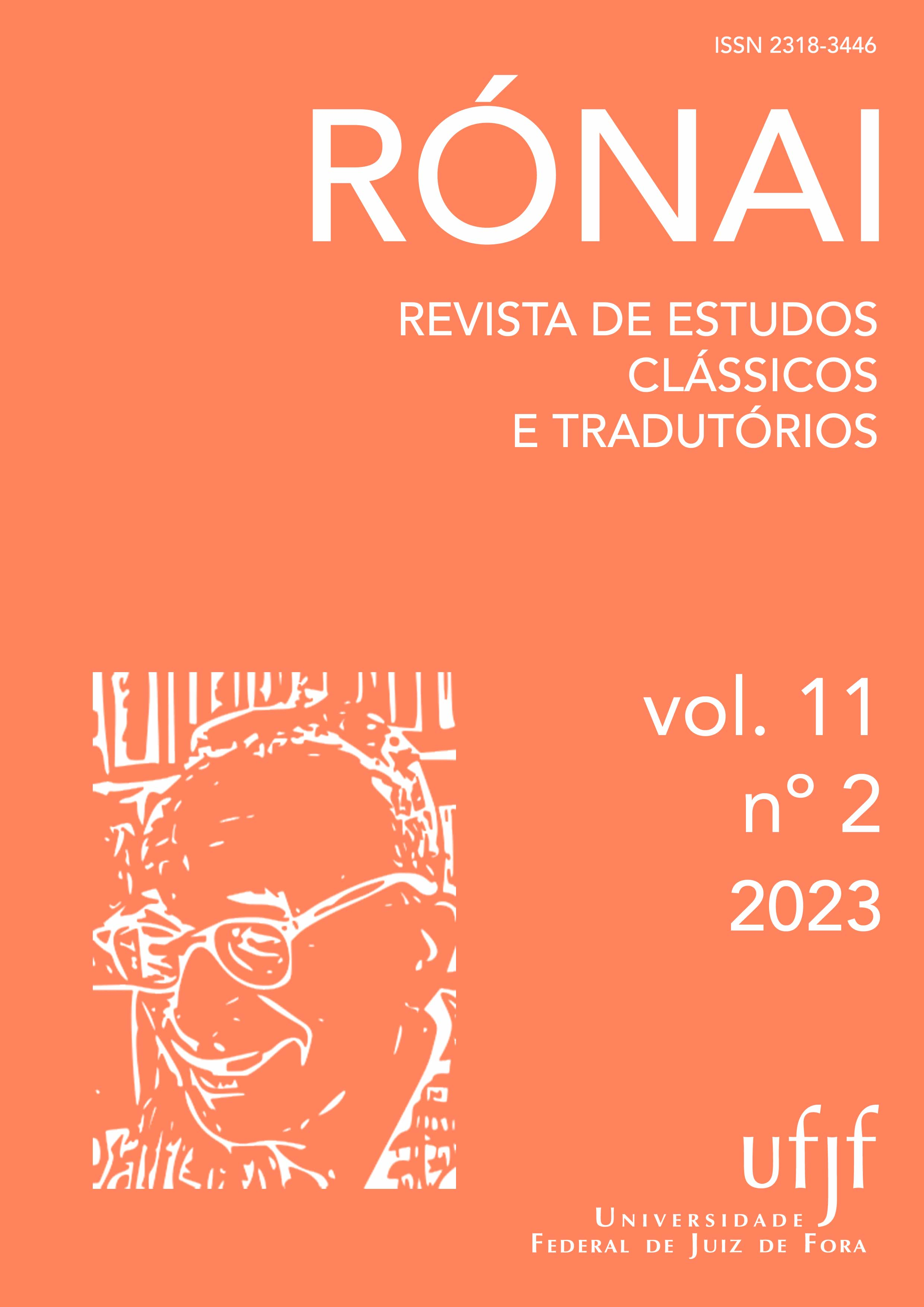Geoponica 15.2: introduction and translation
DOI:
https://doi.org/10.34019/2318-3446.2023.v11.41541Palabras clave:
Geoponica , bougonia, Byzantine period, technical literatureResumen
This paper proposes an introduction with general explanations about the technical collection from the Byzantine period, Geoponica, followed by a translation of section 15.2 into Portuguese. The work, which dates from the mid-10th century, was dedicated to Constantine VII Porphyrogenetus, Byzantine emperor born in 906 and died in 959, and was inserted, at the time, in the new historical approach of Antiquity to make encyclopaedic compilations of knowledge of the ancient world. The collection consisted of 20 books of technical content and dealt with the many facets of work in the fields. Section 15.2 contains one of the few detailed records of bougonia, the procedure for generating bees from a dead ox. The procedure is part of the cultural and folkloric framework of classical culture, and the text now translated into Portuguese acquires importance because, together with Virgil's Georgics 4, it offers a detailed description of the procedure.
Descargas
Citas
CALLIMACHUS. Volumen I. Fragmenta. Edidit R. Pfeiffer. Oxonii: E TypographeoClarendoniano, 1949.
CANCIK, H.; SCHNEIDER, H. (Eds). Brill’s New Pauly: encyclopaedia of the Ancient World: Antiquity. English Edition Christiane F. Salazar et al. Leiden-Boston: Brill, 2003-2010.
CASSIANUS. Γεωπόνικα: agricultural pursuits. Vol. II. Trans. by T. Owen. London, 1805.
CASSIANUS. Geoponica siue Cassiani Bassi Scholastici de re rustica eclogae. Ed. Henricus Beckh. Stuttgart: Teubner, 1994.
Oxford English Dictionary [OED] CD-ROM, version 4.0.0.2, 2009.
GOW, A. S. F. ΒΟΥΓΟΝΙΑ in Geoponica XV.2. The Classical Review. Vol. 58, nº 1, p. 14-15, 1944.
HORNBLOWER, S; SPAWFORTH, A.; EIDINOW, E. (Eds.). The Oxford Classical Dictionary. 4.ed. Oxford: Oxford University Press, 2012.
HOUAISS, A. Dicionário Houaiss da Língua Portuguesa. Com a nova ortografia da Língua Portuguesa. Rio de Janeiro: Objetiva, 2009.
JONES, A. H. M; MARTINDALE, J. R.; MORRIS, J. The Prosopography of the Later Roman Empire. Vol. 1, AD 260-395. Cambridge: Cambridge University Press, 1971.
LIDDELL, H. G.; SCOTT, R.; JONES, H. S. A Greek-English Lexicon, with a revised supplement. 9.ed. Oxford: Clarendon, 1996.
MUNIZ, L. Cenas de restauração: a grotesca imagem da bugonia nas Geórgicas 4.281-314. Rónai: Revista de Estudos Clássicos e Tradutórios, v. 7, nº 2, p. 17-28, 2019. Disponível em: https://periodicos.ufjf.br/index.php/ronai/article/view/28173/19899. Acesso em: 20 jun. 2023.
NICANDER. The Poems and Poetical Fragments. Ed. with a translation and notes by GOW, A. S. F. & SCHOLFIELD, A. F. Cambridge: Cambridge University Press, 2002.
PAULY, A. F., G. WISSOWA et al. Realencyclopädie der classischen Altertumswissenschaft. Stuttgart: A. Druckenmüller, 1910.
POWELL, J. U. (Ed.) Collectanea Alexandrina: reliquiae minores poetarum graecorum aetatis ptolemaicae. 323-146 a.C. Epicorum, elegiacorum, lyricorum, ethicorum. Chicago: Ares Publisher, 1981.
Descargas
Publicado
Cómo citar
Número
Sección
Licencia
Derechos de autor 2023 Liebert de Abreu Muniz

Esta obra está bajo una licencia internacional Creative Commons Atribución 4.0.
Derechos de autor
Los autores que publican en esta revista aceptan los siguientes términos:
1. Los autores y las autoras conservan los derechos de autor y le otorgan a la revista el derecho a la primera publicación, que está bajo la licencia Creative Commons Attribution License 4.0 Internacional.
2. Los autores y las autoras pueden publicar y compartir el trabajo con reconocimiento de la publicación inicial en esta revista.
3. Los autores y las autoras de las obras aprobadas autorizan a la revista a asignar el contenido de sus obras, después de la publicación, para su reproducción en indexadores de contenido, bibliotecas virtuales y similares.
Para obtener más información sobre Creative Commons Attribution License 4.0 Internacional, acceda a: https://creativecommons.org/licenses/by/4.0/deed.es
Exención editorial
El contenido de los artículos publicados es responsabilidad única y exclusiva de sus autores, y no representa la posición oficial de Rónai - Revista de Estudos Clássicos e Tradutórios o de la Faculdade de Letras de la Universidad Federal de Juiz de Fora o instituciones asociadas.



